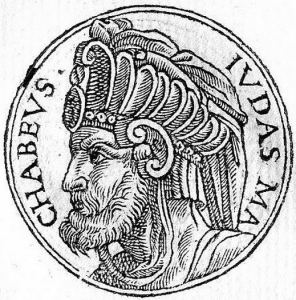The Warrior-Priests of Chanukah
In 166 BCE, after the passing of Matityahu – the Jewish priest (kohen) who instigated the revolt against the Seleucid Greeks – his third son Yehuda (Judah) was chosen as the new leader of the resistance. By this time, Yehuda had made a name for himself as a fearless warrior and skilled military strategist. Nicknamed HaMakabi, “the hammer” (or alternatively, Makab-Yahu, “the one designated by God”), he continued to win battle after battle primarily through guerrilla tactics and surprise attacks. In 164 BCE, Yehuda recaptured Jerusalem and the Temple, re-purifying it, restoring its holy Jewish rituals, and relighting its menorah. Contrary to popular belief, the war did not end at that point. Two years later, Matityahu’s fourth son Eleazar died at the Battle of Beit Zechariah. Identifying what he thought was the war elephant carrying the Greek king, Eleazar slid under it and thrust his spear into its flesh. The dead elephant collapsed unto Eleazar, killing him as well. Perhaps the most pious of the sons, Eleazar was known to publicly read from the Torah before battle. To gain support, in 161 BCE Yehuda signed an alliance with the Roman Empire, though it helped little. A year later, Yehuda died at the Battle of Elasa. His oldest brother Yochanan (John), of whom the least is known, died shortly after in the ensuing troubles. The youngest son Yonatan (Jonathan) was elected the new leader, by now earning a reputation almost equal to that of Yehuda. He continued the victories against the Greeks, and soon after signed a peace treaty with them. The Greeks left the Holy Land, and Yonatan focused his efforts on rebuilding the state, and removing Greek influences and idolatry from the land. In 153 BCE, a civil war erupted among the Greeks, and Yonatan sided with the winning party. He was given the special Greek title of “strategos”, and appointed as the High Priest (kohen gadol). Yonatan was able to further expand the territories of the semi-autonomous Jewish state. Years later, a different Greek king rose to power, and tricked Yonatan into a fatal trap, imprisoning, and then killing him. The last remaining son of Matityahu was Shimon (Simon), who gathered his forces in response to Yonatan’s death, and helped another Greek king come to power. This king then granted Judea its independence, and Shimon established the Hashmonean dynasty which would rule the Holy Land for the next century. Shimon was its first king and High Priest, reigning for five years of peace and prosperity. Tragically, he was assassinated in 135 BCE. His third son John Hyrcanus took power, continuing the Hashmonean dynasty until its ultimate end at the hands of the Romans.
Words of the Week
A person should always be pliant as a reed, and let him never be unyielding as the cedar.
– Talmud, Taanit 20b

